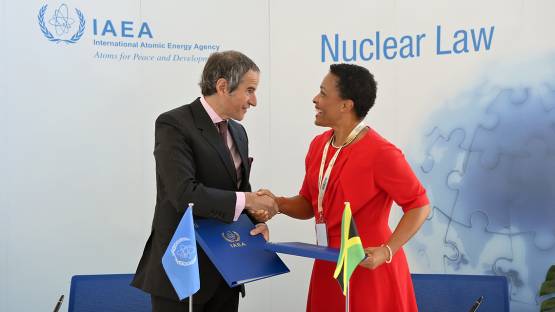Hundreds of aspiring professionals stand to benefit from IAEA-supported programmes on nuclear law in Argentina, Brazil, Egypt, Jamaica, South Africa and the United Arab Emirates, following the signature of partnership agreements with universities in the six countries last week.
The agreements will help increase education and professional development opportunities for students and aspiring professionals in the field of international and national nuclear law.
“In nuclear law, the way people are introduced to the subject – whether they are introduced at all – will determine its future shape,” said Rafael Mariano Grossi, Director General of the IAEA, at the signing ceremony, which took place during the margins of the IAEA’s First International Conference on Nuclear Law: The Global Debate last week. “And in consequence, it will influence how the atom benefits future generations.”
The partnerships will help build awareness on nuclear law as a prerequisite for the safe, secure and peaceful applications of nuclear science and technology among operators, regulators, lawyers, engineers and policy makers; and to build teaching capacity in the field.
“When it comes to nuclear law there are too few opportunities for lawyers or engineering students to get exposed to something so essential for the nuclear field: the legal framework that is underlying all the activities,” said Imraan Valodia, Pro Vice-Chancellor of the University of Witwatersrand, South Africa. “We welcome the opportunity to collaborate with the IAEA to help our students and our faculty acquire additional resources in nuclear law education.”
Within this pilot cooperative framework, the IAEA will work with each institution to develop a series of courses and smaller modules focused on the four traditional branches of nuclear law – safety, security, safeguards and liability – to complement existing national or regional training activities in this field. The courses will be open to students from diverse academic backgrounds, including law, engineering, policy, and communications; smaller modules will be integrated into existing courses such as law, nuclear science and engineering. Upon successful completion of the academic requirements and an internship at a national regulatory body, operator, or relevant organizations, the students will receive a postgraduate certificate in nuclear law.
The initiative will be implemented within the framework of the IAEA Legislative Assistance Programme, which is supported by the Technical Cooperation Programme. Through the Legislative Assistance Programme, the IAEA supports governments in adhering to and implementing international legal instruments in the nuclear field and in developing corresponding national legal frameworks.





